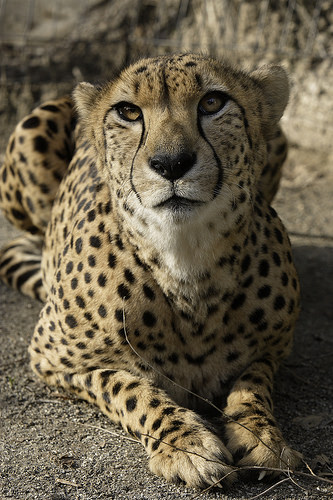Smithsonian's National Zoo Euthanized Male Cheetah
The National Zoo is mourning the loss of an 8-year-old adult male cheetah, Draco, who was humanely euthanized earlier this morning. A final pathology report will provide more information. Typically, male cheetahs in human care have a median lifespan of 10 years. Longevity studies have not been conducted in the wild.
According to his keepers, Draco was a finicky eater his whole life. Recently, he began to show even less interest in food. In order to ensure Draco received the nutrients he needed, keepers and Zoo nutritionists placed meat chunks on a modified tool to interest Draco in the food. Often, it took several feeding sessions throughout the day to entice him to eat.
When you dedicate so much time and attention to an animal, you want that animal to thrive," said Tony Barthel, curator of the Cheetah Conservation Station. "Our team worked tirelessly for a long time to get Draco to eat on his own. Ultimately, his long-term prognosis would not permit him a good quality of life."
Although Draco initially responded well to the staff's efforts, his appetite never normalized. An examination performed by Zoo veterinarians Dec. 11 revealed an abdominal abnormality. A follow-up exploratory surgery Dec. 14 with a consulting veterinary surgeon revealed a constricted, ulcerated area in his gastrointestinal tract, which likely contributed to his poor condition.
Draco arrived at the National Zoo in April 2007 from the White Oak Conservation Center in Florida. He was on exhibit with his brothers, Granger and Zabini. In the wild, male cheetahs from the same litter often live together in groups called coalitions. The bond among animals in a coalition is extremely strong, and managers maintain this natural social grouping in zoos. Draco never sired offspring; rather, he served as an educational ambassador for his species, illustrating the social nature and behavior of cheetahs to scientists, keepers and Zoo visitors.
Cheetahs live in small, isolated populations mostly in sub-Saharan Africa. Many of their strongholds are in eastern and southern African parks. Due to human conflict, poaching, and habitat and prey-base loss, there are only an estimated 7,500 to 10,000 cheetahs left in the wild. The International Union for Conservation of Nature considers cheetahs vulnerable to extinction.
Zoo visitors can see Granger, Zabini and two sub-adult cheetahs at the Cheetah Conservation Station.
Photo credit: Smithsonian's National Zoo
